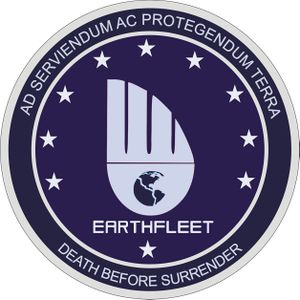Clayton Doctrine
The Clayton Doctrine was a military doctrine set down by Grand Admiral Mike Clayton after The Battle of the Oort Perimeter, which stated that Earthfleet, going forward, would focus exclusively on smaller, powerful, more agile and faster ships that could provide the fleet with the high degree of effective, defensive firepower that it needed, without requiring the corresponding the large crew compliments of previous ship generations, thus abandoning the ages old doctrine of using crew heavy battleships, battle cruisers and other primary capital ships for Sol Sector's primary defense.
The primary reason for this change of doctrine was that 1) Earthfleet's mainline capital ships were not up to the task, nor strong enough, to properly defend Sol Space against her greatest enemies. And 2) the older battleships that they had once fielded were very crew heavy (a side effect of Gayik'Von doctrines and preferences), which was, and still is, a problem for the fleet as they're always short on staff, even leading to a period of time that necessitated filling large gaps in the fleet with android crewmen until enough new staff, both through recruiting, and inductees, could be brought onboard to fill the massive deficiencies in crew numbers.
And, while the Clayton Doctrine was eventually abandoned around 30 years after Mike's retirement, it did have a lasting effect on Earthfleet ship designs leading to the creation of the Mythos class which took into account the fleet's need for firepower, and it's perpetual shortage of staff members. This is how Earthfleet ended up with its first "Fleet Killer", a battleship powerful enough to wipe out entire fleets of standard enemy capital ships, from frigates all the way up to dreadnoughts, while also ensuring that the ships remained lightly crewed through extensive automation of every aspect of the ship's functions, maintenance, and more.
And, while the doctrine as a whole was abandoned, a significant portion of its core precepts were adopted into later doctrines, including the efforts to maintain small crew requirements for all current and future ships to better make use of the fleet's limited staffing resources. It also helped push the focus of fleet development in the direction of maximizing offensive, and defensive firepower to create ships that were as invincible as they could possibly be made to be. This focus on overwhelming firepower quickly earned Earthfleet, and all of Sol, a massive amount of respect within the galaxy such that, aside from a few small incidents, The Nine Ancient Races, and much of the rest of the galaxy, left them alone for the most part, which was something that the Brayburn Society, and Earthfleet by extension, had wanted, since the Destiny took to the stars almost 250 years earlier.
